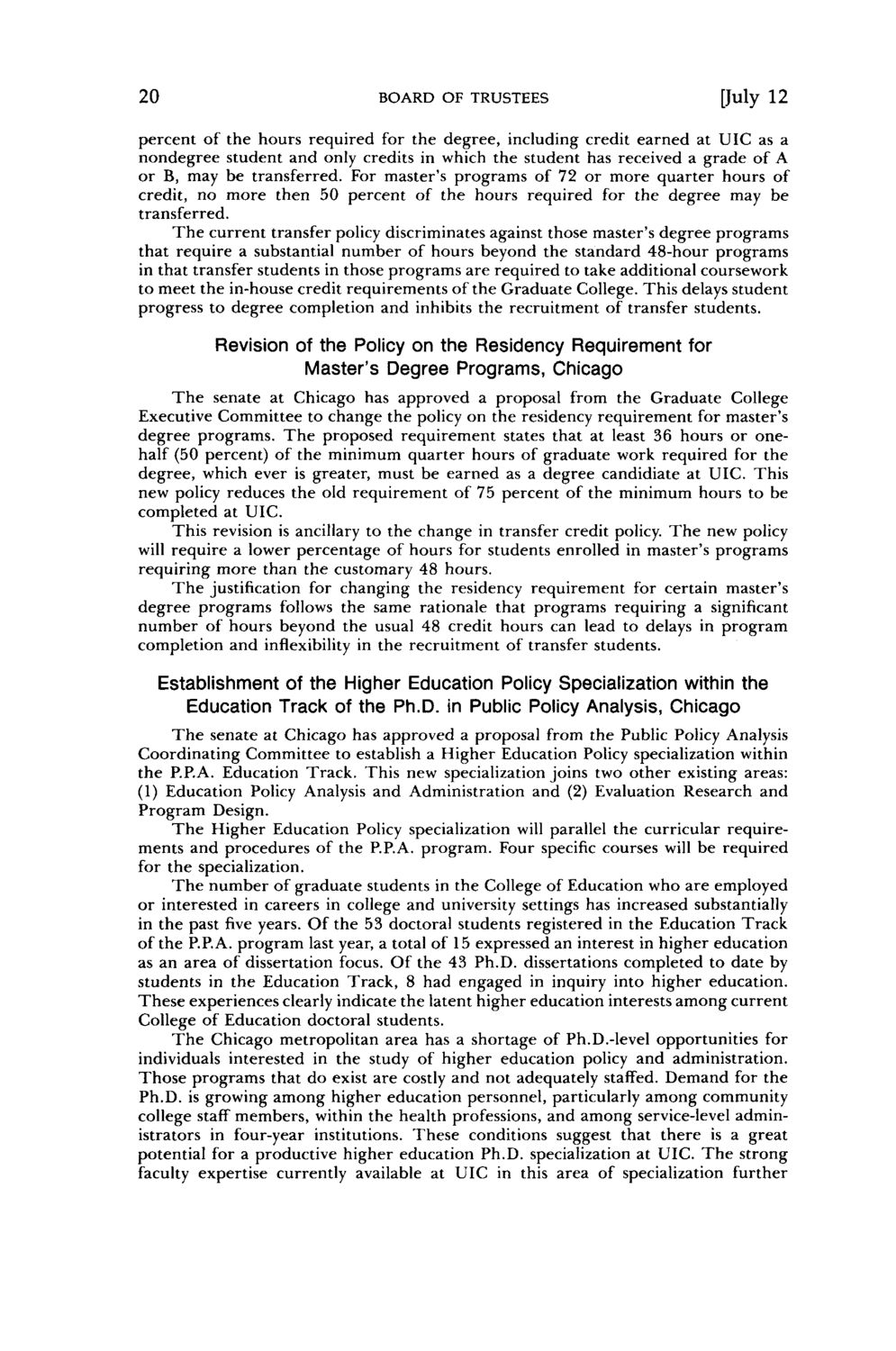Caption: Board of Trustees Minutes - 1990
This is a reduced-resolution page image for fast online browsing.

EXTRACTED TEXT FROM PAGE:
20 BOARD OF TRUSTEES [July 12 percent of the hours required for the degree, including credit earned at UIC as a nondegree student and only credits in which the student has received a grade of A or B, may be transferred. For master's programs of 72 or more quarter hours of credit, no more then 50 percent of the hours required for the degree may be transferred. T h e current transfer policy discriminates against those master's degree programs that require a substantial number of hours beyond the standard 48-hour programs in that transfer students in those programs are required to take additional coursework to meet the in-house credit requirements of the Graduate College. This delays student progress to degree completion and inhibits the recruitment of transfer students. Revision of the Policy on the Residency Requirement for Master's Degree Programs, Chicago T h e senate at Chicago has approved a proposal from the Graduate College Executive Committee to change the policy on the residency requirement for master's degree programs. T h e proposed requirement states that at least 36 hours or onehalf (50 percent) of the minimum quarter hours of graduate work required for the degree, which ever is greater, must be earned as a degree candidiate at UIC. This new policy reduces the old requirement of 75 percent of the minimum hours to be completed at UIC. This revision is ancillary to the change in transfer credit policy. T h e new policy will require a lower percentage of hours for students enrolled in master's programs requiring more than the customary 48 hours. T h e justification for changing the residency requirement for certain master's degree programs follows the same rationale that programs requiring a significant number of hours beyond the usual 48 credit hours can lead to delays in program completion and inflexibility in the recruitment of transfer students. Establishment of the Higher Education Policy Specialization within the Education Track of the Ph.D. in Public Policy Analysis, Chicago T h e senate at Chicago has approved a proposal from the Public Policy Analysis Coordinating Committee to establish a Higher Education Policy specialization within the P.P.A. Education Track. This new specialization joins two other existing areas: (1) Education Policy Analysis and Administration and (2) Evaluation Research and Program Design. T h e Higher Education Policy specialization will parallel the curricular requirements and procedures of the P.P.A. program. Four specific courses will be required for the specialization. T h e number of graduate students in the College of Education who are employed or interested in careers in college and university settings has increased substantially in the past five years. Of the 53 doctoral students registered in the Education Track of the P.P.A. program last year, a total of 15 expressed an interest in higher education as an area of dissertation focus. Of the 43 Ph.D. dissertations completed to date by students in the Education Track, 8 had engaged in inquiry into higher education. These experiences clearly indicate the latent higher education interests among current College of Education doctoral students. T h e Chicago metropolitan area has a shortage of Ph.D.-level opportunities for individuals interested in the study of higher education policy and administration. Those programs that do exist are costly and not adequately staffed. Demand for the Ph.D. is growing among higher education personnel, particularly among community college staff members, within the health professions, and among service-level administrators in four-year institutions. These conditions suggest that there is a great potential for a productive higher education Ph.D. specialization at UIC. T h e strong faculty expertise currently available at UIC in this area of specialization further
|